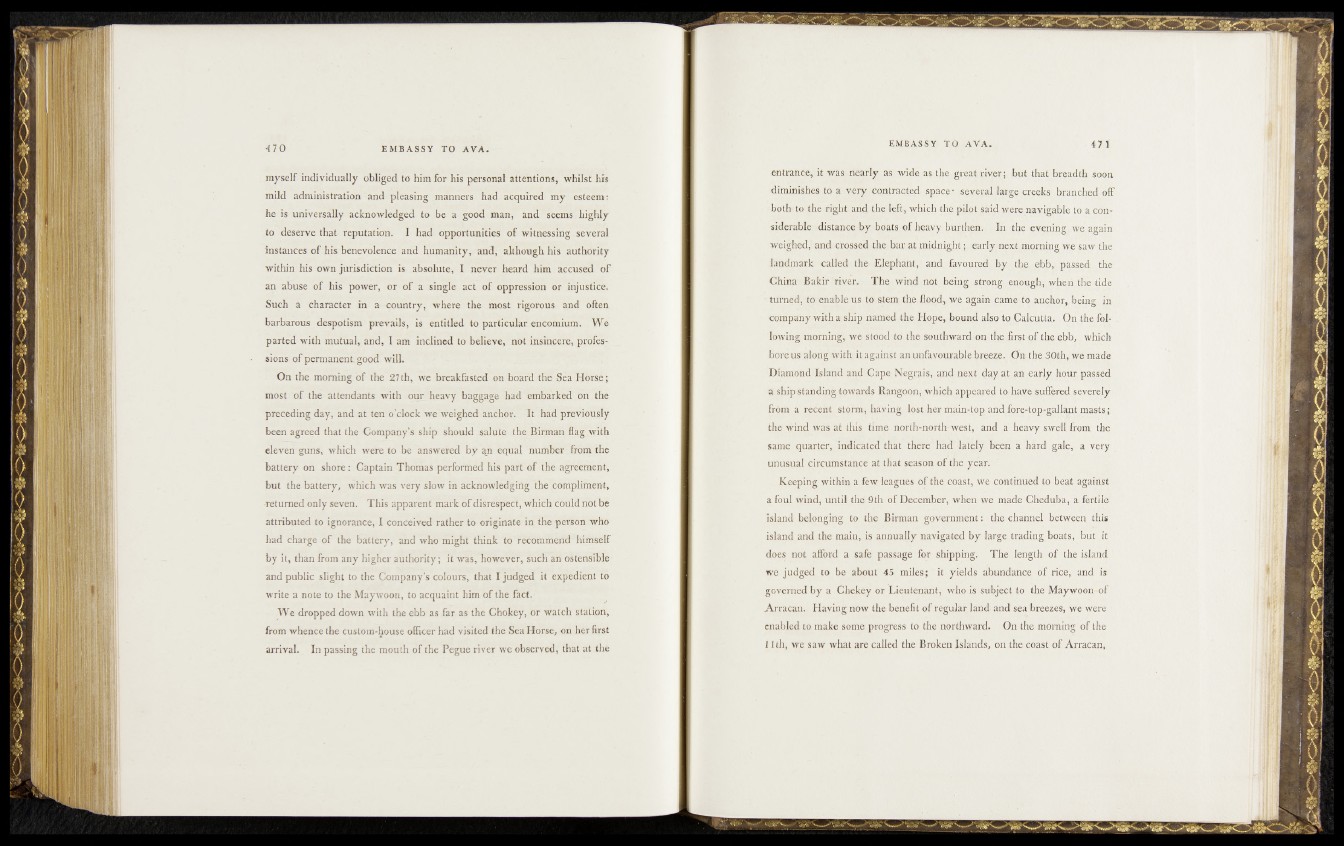
myself- individually obliged to him lor his personal attentions, whilst his
mild administration and pleasingmanners had acquired my esteem:
he is universally acknowledged to be a good many and seemb - highly
„to deserve that reputation. I had opportunities of witnessing, several
instances of his benevolence arid humanity, and, although his authority
within' his own jurisdiction is absolute, I never heard him accused, o f
an abuse of his power, or of a single act of Oppression or injustice.
Such a character in a country, where the most rigorous and often
barbarous despotism prevails, is entitled to particular encoriiium. We
parted with mutual, and, I am inclined to believe, not insincere, profes-
sions of permanent, goocT will.
On the morning of the 27th, we hreaklasted on board the Sea Horse;
most 'of the attendants with our heavy baggage had embarked on. the
preceding day, and at ten o’clock we weighed-anchor. It had previously
been agreed that the -Company’s ship should .salute the Birman flag with
eleven guns, which were to be answered by qn equal number from fjie
battery on shore: Captain Thomas performed his part of the- agreement,
but the battery, which was very slow in acknowledging the compliment,
-returned only seven. This apparent mark of disrespect, which could not be
attributed to ignorance, I conceived rather to originate in the person who
had charge of the battery, and who might think to recommend himself
by it, than from any higher authority; it was, however, such an ostensible -
and public slight to the Company’s colours, that I judged it - expedient to
write a note to the Maywoon, to acquaint him of the fact.1
We dropped down with the ebb as far as the Chokey, or watch station,
from whence-the custom-house officer had visited the Sea Horse, on her first
arrival. In passing the mouth of the Pegue river we observed, that at the
entrance;» it was nearly^ as. wddc»asythe. droatvrivp »:. but thafcb»readtb soon
diminiSh.es> to, Etiyery^c.qA'act^tl^pric^ s o c ia l large {creeks?, branched off
dsplthat® 4{te irigbt antj^qde&g which th,e, pjjot^a.id werWnayigable to a considerable
sdistejnce-by boats»,bf.hffa&y burtbgn; yin ;M e evening^wfi* again
weighed,5 and..cres$ecf£he,!hai*.ql irndnighiQalLjvnexUnionntig, we sa,yr the
dhhdmrfrk‘called,?the-1'Elephant, and, fayqufpd^J5,ylfh^,ebJb!,, passed the
China Ba’kir *rjver. The win^i not,L^ingj strongsenough,-vihen.the ude
* trirned,'tqferui'ble>'Us.vto stem die.ilaocjjjfWi, dgaui^ametlh^auLlmr,, being in
conipany with afsliip »named the f^ope^bpupd also tp_,Cakiifcfao>s On, the fol- .
lowing moining, n t stood to the southward on the first pi the ebb, which'-
^reus.alorigrivithi itagai-nsi an unf^vguj-able breeze. ,Op£tjjh.30th,;we made
Diamond Islari'd-.afed^Cfip^ -hfegeis,»} and n'ext day dtidmpailvy mix, passed
a ship standing towards Rangoon, which appeared tq.hdvq,suflero(l sescrely1
from a recent storm? having lost her main. tpnaqcktee-topgallant rrfastithe
wind was at this tim®;nprthmprth-west, and a heavy swelfliorn the 1
same quarter, indicated fnit there Had lately been h Hard gale, a very
unusual1 circumstance at that season ok the year.
Keeping within, a few leagues of the coast, weW<ptti)|ued beat- against
a foul wind, until the 9 th o f December,'when we made- Chcduba, d'fertile
lslepd belonging to the Birman government:' the Sfialiinplgbntwetn this
island and the main, is annually navigated bylatgpi trading boats, ffl®,it
does not afford a safe passage for shipping. The? length o f the island
we judged to be about 45 miles; it yields abundance of ric ^ 'an d i.r
governed by a Chekey or LieulejMSt, Who is subject to the Maywoon-bfi
Arracan. Having now the benefit o f reguldr land and sei In i / ls, ?u > '
enabled to make some progress to the northward. On the m6rning Jclfjtlie
11th, we saw what are called the Broken Islands,' on .rae'ooast of Arracan,